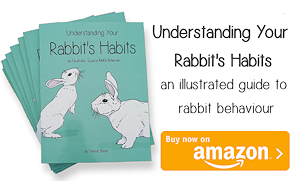Monitoring Your Rabbit's Diet
No single diet can be right for every rabbit and getting the right balance of foods can be complicated. Even rabbits the same size may have different diet requirements. The exact combination and quantity of foods a rabbit requires daily to meet their energy and nutrient needs depends on several factors including their age, size, environment, and level of physical activity. As these factors change throughout your rabbit's life you will need to reassess their diet regularly to ensure it is still meeting their needs.
Here are tips on adjusting diet to suit different rabbit's needs:
And some general information on adjusting diet for different factors:
Factors Increasing Protein Requirement
- Pregnancy & lactation (feeding babies)
- Growing new fur during a moult
- Recovering from an injury
- Growing (babies)
Pregnant rabbits and growing babies benefit from dry food with slightly higher (16-18%) protein content than standard. Adding some alfalfa to their grass hay also increases protein. Rabbits with long fur e.g. angoras may need higher protein food or higher quantities of dry food to maintain their coat.
Factors Increasing Energy Requirement
- Very small rabbits have a higher metabolic rate than large rabbits, which means they use more energy just resting
- Stress increases the energy a rabbit uses. Short-term stress such as a trip to the vet or meeting a new rabbit should not affect rabbit's nutritional requirements but long-term stress such as an unsuitable environment may. Nervous rabbits may have higher energy requirements simply because they spend less time in a completely relaxed state when energy requirements are at their lowest.
- In cold weather, rabbits living outside expend extra energy in order to keep themselves warm.
Generally these needs can be met by adjusting the quantity of dry food whilst monitoring weight, if your rabbit maintains a healthy weight their energy requirements are being met, if they are under or losing weight a slight increase in dry food maybe needed. Rabbit's guts are very efficient though so be careful not to adjust too dramatically.
Factors Decreasing Energy Requirement
- Neutering
- Obesity
- Limited exercise
- House rabbits need less energy, as they do not have to cope with extreme weather variations.
It's easy for rabbits to become overweight when given dry food which is very energy dense. The best option here is to ensure your rabbit has a diet that is around 80% hay. This provides the correct nutritional balance and helps maintain a healthy weigh.
A Note about Physical Activity: Rabbit's use more energy when they are moving around than when resting, and the more physical effort an activity involves the more energy is used. A rabbit that spends the majority of its time free-range will need a diet that provides more energy than one that spends most of its time confined to a cage or hutch. Physical activity is important to your rabbit's well-being so rather than decreasing high energy food if your rabbit is not very active try encouraging them to increase their activity level instead.
Monitoring Your Rabbit's Diet
Monitoring your rabbit's weight and droppings are the best ways to check your rabbit's diet is correct and to spot potential problems quickly. Dropping provide an overview of your rabbit current digestive health and weight will tell you if your rabbit's diet is providing too many calories (which are being stored as fat), not enough or just the right amount to maintain a consistent weight.
A change in weight or droppings can also signal non-diet related health problems so monitoring these can help identify and issues that needs addresses early.















